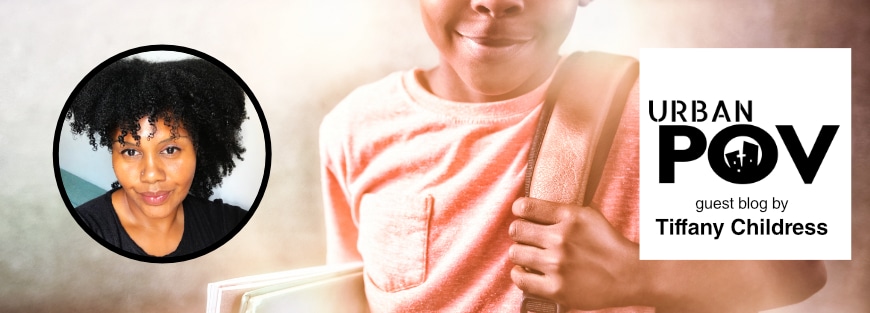Navigating Back-to-School New Norms
Posted by: DVULI | August 27, 2021

I opened my six-year-old’s last report card from kindergarten on one of the first relaxed mornings of our summer break.
“Concentrates on the task at hand.” Check.
“Expresses feelings in appropriate ways.” Check.
“Plays cooperatively with others.” BLANK.
Enter “Mother Panic.” What does this mean? Should I be concerned about certain social issues?
Then I remembered the pandemic. In Chicago, like many other large cities, our schooling ended abruptly with no warning in the spring of 2020. We didn’t return to school buildings for 14 months. My son hadn’t seen any other children with whom to cooperate, and his teacher simply couldn’t evaluate that skill.
As a mother of young school-age children (six and seven at the beginning of this school year), I have been concerned about my children’s emotional health, mental health, academic growth, and sense of safety in the world. Any sense of security, stability, and normalcy that children have known has been disrupted. My son lamented for months about his plans for a fun trampoline park birthday extravaganza that abruptly turned into a Zoom party with his family and a few friends. My husband did try to make it more special by casting the Zoom meeting on the large screen at his barbershop, but my son still felt alone and disappointed.
On the first day of school, our kindergartener, who loves the social dynamic of school, got up early, put on his clothes, ate breakfast, and announced that he was ready to leave. We reminded him again that school would happen through his laptop screen. He burst into a river of tears, and after 15 minutes of trying to figure out how to log in, he tearfully greeted his classmates by name and said that he had missed them.
I have experienced the pandemic from three lenses: academic researcher, teacher, and neighbor.
As a researcher, I consider the sociocultural nature of schooling. Sociocultural interactions affect brain function like memory and executive function in positive or negative ways. Schooling is foundational to a child’s emotional, cognitive, psychological, and even spiritual development. Children and adolescents learn relational boundaries, develop healthy and unhealthy ways to engage in the community, and develop or stimy their sense of identity and agency through schooling processes. There is simply no substitute for community building and engagement within the ecosystem of learning communities (both inside and outside of the classroom).
As a teacher, I stayed up all night, cried, and doubted myself in new ways. Many teachers left the profession during the pandemic for new careers or early retirement. We were asked to recreate a profession with nominal support as we pioneered this reimagination. One of my friends described it as “building the plane while we’re flying it and building a second on the weekends.” New hardware, new software, new online platforms, and production that seemed fitting for a studio became our new reality.
One of the greatest challenges was the emotional labor of supporting students through some of the most traumatic experiences of their lives: addiction relapse, suicide of family members, parents’ unemployment, COVID infections throughout multigenerational households, and COVID-related deaths of family members. Top students at my high school (number four in the country) missed dozens of school days. Truancy became expected for many students who were now juggling jobs or caregiving. How could I expect students to learn the periodic table when they were worried about their frontline worker parents contracting this deadly virus?
As neighbors, my husband and I worried for those in our already heavily burdened community on the west side of Chicago. We were concerned about single parents managing online learning and choosing between going to work to stay employed (leaving young children home unattended) or losing work. We heard the stories of third graders who were responsible for their younger siblings while a parent went to work. We worried for the mental health of completely maxed out parents who found themselves unprepared to co-teach with their children’s teachers, who were only accessible through screens.
Considering all of the ways the pandemic has affected children, caretakers, teachers, schools, and communities, how can the youth worker and local ministries support our transition into another strange school year? The pandemic is not over. In my state, COVID cases are up nearly 200 percent in the last two weeks. Concerns about the new Delta variant are causing some cities to return to lockdowns. To support your local community, here is a suggested list of actions you can take:
- If possible, volunteer to help schools and teachers set up classrooms. In some cases, staff have been away from their classroom spaces for over a year.
- If you were a high school or college athlete or know a sport well, consider coaching! Many young people have been sedentary at home and will be looking for ways to be active, safely with others.
- Inventory your networks for particular academic skill sets. Know an engineer, chemist, or reading specialist? Invest in a church sponsorship to support experts as they tutor students in academic subjects and serve to connect with young people who need support. Remember, some students missed months of school during the pandemic, and some still won’t be returning in the fall.
- Build a church fund to sponsor students to attend extracurricular activities like sports, dance, music, and specialized academic support.
- Adopt a teacher! Send them emails of encouragement (I keep every note I’ve ever received) and send coffee gift cards.
The thing that filled and continues to fill me with hope and inspiration—even as the challenges continue to come—is the incredible creativity, ingenuity, and “empathy in action” that our families, students, school faculty and admin, churches, and neighbors have had for one another. Truly we are in this together and we will continue to support one another to reach the next milestone!

